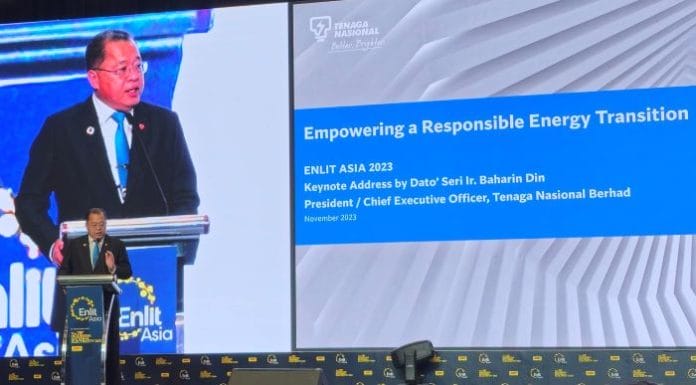In efforts to become a truly green-powered nation a comprehensive energy transition mechanism with collaborative support from government, investors and key stakeholders is essential. At a recent address at the ENLIT ASIA 2023 conference, TNB’s President and Chief Executive Officer, Dato’ Seri Ir. Baharin Din shed light on the critical challenge of accelerating a responsible ET in balancing the energy trilemma that involves balancing the need for energy security, energy sustainability and energy affordability.
He highlighted the need for a responsible ET to address the rapidly increasing demand for electricity and emphasised that TNB is prepared to meet this demand while reducing emissions.
“Within the ASEAN region, the goal is to source 3,000 GigaWatt (GW) of capacity from clean energy. Currently, ASEAN has installed 95GW of thermal fuel and 188GW of renewable energy (RE). By 2050, the region aims to reach over 2,700GW of RE,” said Baharin.
Policy, green technology, and funding are key enablers of a successful ET. Baharin stressed the substantial investment required to achieve ASEAN’s Net Zero goals by 2050. He expressed optimism in the shifting landscape where governments are actively setting policies to support the growth of low-carbon businesses.
As for Malaysia, the National Energy Transition Roadmap (NETR) focuses on RE, energy efficiency (EE), hydrogen, bioenergy, green mobility, and carbon capture. Baharin emphasised the transformative role of these initiatives in transitioning Malaysia towards a sustainable, green economy.
“Collaborative partnerships with regional counterparts through platforms like HAPUA (Heads of ASEAN Power Utilities/Authorities), SOME (Senior Officials Meeting on Energy), and AMEM (ASEAN Ministers on Energy Meeting) have expedited progress towards sustainable energy objectives,” added Baharin.
Strategic Partnerships: Advancing Malaysia’s Energy Transition Goals
Malaysia plays a pivotal role in facilitating collective ET objectives within the region. Baharin said the country is bolstering its transmission infrastructure to strengthen regional cooperation and support the interconnection of energy systems across borders through the ASEAN Power Grid (APG).
“At present, we can support an extra 12GW of new solar plants and battery storage at specified nodal points in our domestic infrastructure, in addition to the existing 4GW of RE. We are proactively identifying more nodal points to match our national goal of reaching 70% renewable energy capacity by 2050 and fulfilling the energy demands of neighbouring countries when necessary.”
Strategic partnerships are key to advancing Malaysia’s ET goals. To date, TNB has signed 29 Memorandum of Understandings (MoUs) with local and international partners in various ET fields such as solar parks, integration of hydrogen and ammonia in power plants, interconnection, and electric vehicles.
“TNB believes that a collaborative approach, along with supportive policies, technology advancements, and adequate funding, is crucial for a successful ET while addressing the energy trilemma,” he concluded









